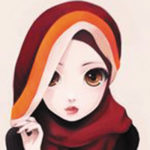I am a teenager, nobody forced me to cover myself. It’s my choice. But, the people around me tend to mistake my dress for oppression.
By Zahra Afreen
I heard a snigger from behind, I turned. Oh, the usual. I was wearing my usual attire of loose, black clothing and a head cover. I turned back. This was nothing extraordinary for me. People laughing at my choice of dress did not bother me now. I was surprised at first that somebody would find my choice of covering myself funny, but then, there were media stereotypes thanks to which I was called ‘oppressed’. Although I wear it out of choice, people think I am forced into wearing it.
It’s My Choice
These days there is lot of talk about freedom of speech, whatever happened to freedom of dress? Don’t these people realize that the girl or woman in that dress may have reasons to be in it? I am a teenager, nobody forced me to cover myself. It’s my choice. But, the people around me tend to mistake my dress for oppression. For me, this dress is a way of liberation. Which woman doesn’t like to show off her adornments? But when these adornments are preserved only for those entitled to, they become precious. Teenagers nowadays are obsessed with looks, they want to look pretty all the time just like the models and movie stars they idolize, not realizing that many of the images they see are photo-shopped/false. There is a difference between looking presentable and being obsessed with looks.
Why do girls have to wear less clothing to be attractive, while men are fully covered? Does a scarcely-dressed woman define liberation? There are women out there who want to be recognized for what they are, not for how they look. As a teenager myself, I know what crisis it is to try and look good every day. Looks are considered everything. Pull that from a person and behold, she is faceless. Is that all what women have become over time? It is true that there may be women out there who are forced to cover themselves who can be called oppressed. But for the majority it’s a choice they make, like I do.
Symbol of Modesty
When I cover myself, I feel oddly free. This is a symbol of modesty, not oppression. People want to work for women’s empowerment, but there are other things to be done than pointing fingers at women who choose to cover themselves. Rights in property, abolition of dowry, equal salaries etc. are more practical goals than abolition of veiling.
My country, India has given me all rights to veil myself, but some people think I am oppressed. Some pity me, some make fun of me. I want to tell all those people out there: a woman who is veiled is not oppressed, she is liberated. Why would I want everybody who looks at me judge me by my body? I have a voice, a talent, a potential. Don’t just take one look at me and decide my potential. The woman who is respected for what she is, not what she wears, is liberated. I veil. I am liberated.
(The writer is a student pursuing her B.Tech. at Hassan Agriculture College).


COMMENTS